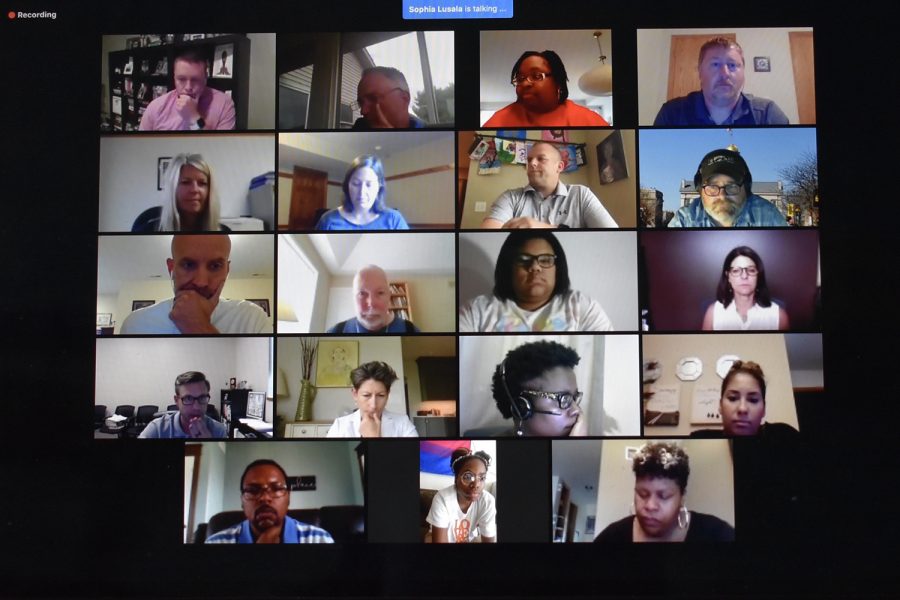Iowa Freedom Riders seek clarifications to the Iowa City Community School District’s responses to demands
At a Wednesday school board work session, The Iowa Freedom Riders called for more specific and intentional responses to their demands for a supportive educational environment for people of color.
Freedom Fighter and Iowa City alumn, Sophia Lusala, reads of the lists of changes their organization has proposed over a Zoom call on Wednesday July 1, 2020. The list had seven demands including: removal or School Resource Officers (SRO), diversified school board, anti-racist curriculum, creation of an equity team, mental and financial support to students and staff of color and an open space to talk about complaints of racial bias.
July 1, 2020
After reviewing the Iowa City Community School District’s response to demands for a more inclusive academic environment, the Iowa Freedom Riders called upon the district’s board to specify what actions it will take to prevent discriminatory practices on school campuses and to ensure accountability.
The Iowa Freedom Riders sought clarification to the school district’s response to their previous demands presented at the board’s meeting on June 23, asking for more specific language and consequences to be included in the decisions.
City High School junior Sophia Lusala, who led the discussion with Iowa Freedom Riders organizer Akia Nyrie Smith and West High School graduate Raneem Hamad, said the meeting aimed to address the school board’s work toward actionable steps, not to be a platform to defend past policies.
“This [meeting] is not to have white voices dominating the conversation,” Lusala said, “… or gaslighting and erasure of the BIPOC experiences, and not white fragility creating excuses. This is not an attack — it is a call to accountability.”
Clarification of the demands centered around stronger language for accountability in reference to the review process for referrals to alternative high schools; cutting ties with the Iowa City Police Department, in reference to the demand to end police presence on campus; and creating more inclusive and proactive groups dedicated to making change.
Interim Superintendent for Iowa City schools Matt Degner said the referral process of sending students to Tate High School, an alternative high school in the Iowa City district, alerted the board to some problems, but it was unaware of how many conversations were occurring that did not match their expectations.
“What we have learned from conversations is that Tate is being used as a punishment, or ‘if you don’t do this, you’ll go to Tate,’” he said. “It should be how Tate is presented to families is a choice. Referral into Tate is something that we need to look and improve upon, but also looking at our core program in our high schools so students do not fall behind. It’s a two-fold problem.”
Smith said the Iowa Freedom Riders were concerned with the disproportionate number of Black students and people of color entering Tate under the impression that it was a punishment. They said a further clarification of where the referrals were coming from and who was providing the referrals was necessary as well.
The school board and the Iowa Freedom Riders called for a limitation of police presence on school campuses on June 23. The district said it would pass a policy to prohibit law enforcement agencies, including the Iowa City Police Department and Coralville Police Department, from patrolling the grounds, interfering in situations on campus without permission from the school, and reviewing procedures of police presence on campus.
However, Lusala and Smith said that a narrower policy is needed in order to provide a more welcoming environment for all students. The Iowa Freedom Riders recommended cutting all ties with the Iowa City Police Department and providing more de-escalation training for faculty members to prevent police from having to come on campus.
RELATED: Iowa City staff responds to Iowa Freedom Riders’ demands
Iowa City Community School District Director of Equity and Employee Relations Jeremy Tabor said the Occupational Safety and Health Association, a federal organization, required the ability for teachers to call the police if a student or faculty member was in a situation threatening to their safety or health, and gave an example of a student with a gun on campus.
Iowa City school board member Charlie Eastham said the demand focused less on situations involving firearms, however, and more about preventing police from interfering in situations that could be better handled by individuals trained in de-escalation tactics.
Smith said they were concerned that individuals trained as a care and threat assessment team to help students in tense situations would evolve into becoming Social Resource Officers, whom the Iowa Freedom Riders demanded be banned from all public schools.
“We would want transparency on who encompasses the team,” Smith said. “What are the regulations? Is student information being shared through the team that could potentially cause bias towards the student? Is this a gateway to have SROs without calling them SROs?”
Degner agreed with Smith and said the spirit of the threat assessment team is to stop letting the traditional responses be the normal response, and that there are several methods for how to deal with a student in crisis rather than approaching it with discipline or law enforcement.
Smith said having a Black Lives student union or organization would allow for students to voice their concerns about certain policies and curriculum with staff members that they trust, and to determine if the situation requires further conversation with a higher level administrator. They said many students will feel uncomfortable speaking up against racial injustice if they feel nothing will get done, so having the conversation will expand avenues for students to feel their voices are being heard.
Eastham added that during the current political climate, the concerns voiced by the Iowa Freedom Riders would be useful to help the school board move forward to improve the school environment and making significant change.
Many of the school board members ended the meeting by expressing their appreciation for the Iowa Freedom Riders coming together and presenting these demands in a timely fashion. Smith said the organization was grateful for the opportunity to express its ideas and concerns.
“We need to both come together and have this conversation, and a lot of people are not willing to do that,” Smith said. “The fact that the school board is willing to do that and go even further to say ‘we want everyone to come in and make sure everything is right’ is a huge step. We are offering to be at the table, and we are appreciative of this seat at the table, because this is how we are going to get change.”





